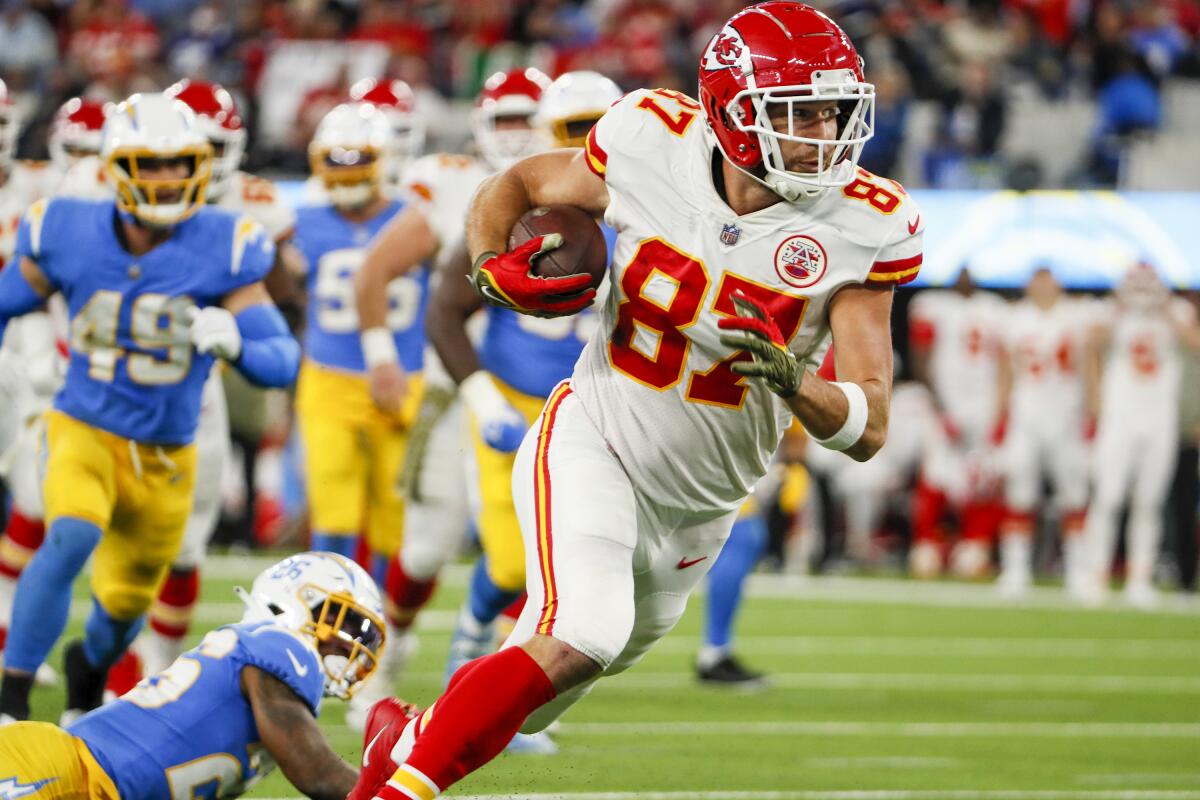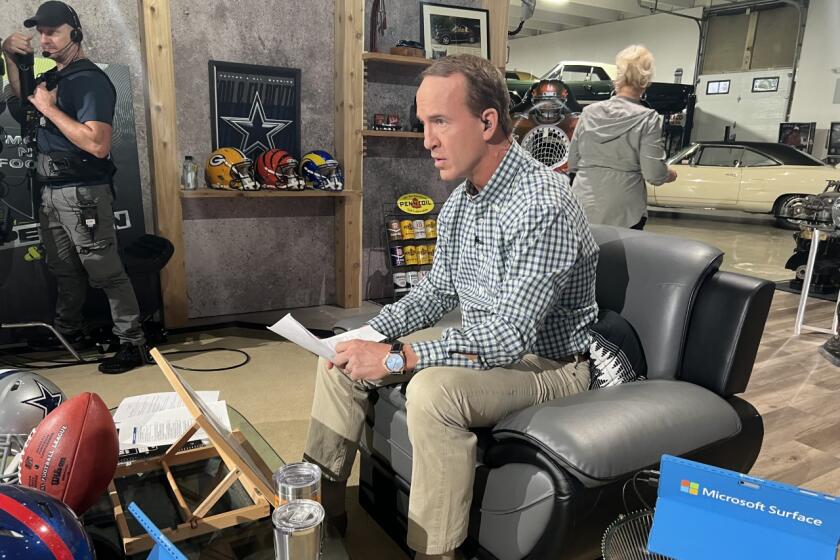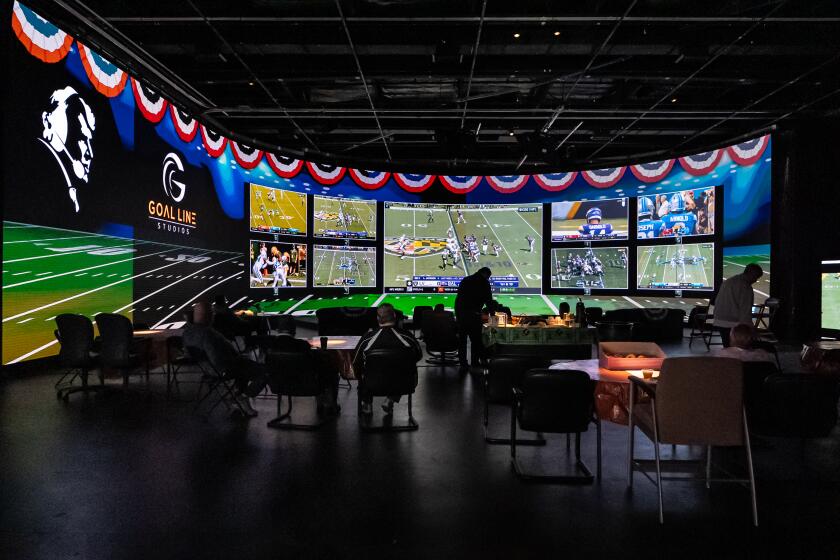From Peyton Manning to Travis Kelce, NFL stars look back fondly on ‘SNL’ experience

- Share via
Fran Tarkenton arrived in New York City exhausted, dispirited and maybe a little confused.
Three days earlier, the Minnesota quarterback had lost to the John Madden-coached Oakland Raiders in the Super Bowl, trudging off the field at the Rose Bowl on Jan. 9, 1977, leaving the Vikings with an 0-4 record on football’s biggest stage.
Now, a different stage. Win or lose, Tarkenton had made a pregame commitment to “Saturday Night Live,” NBC’s edgy, late-night comedy show that debuted a year earlier and turns 50 on Friday.
Never before had a sports celebrity guest-hosted the program. The lanky future Hall of Famer was unfazed by the football-themed cold open that featured John Belushi as coach and fellow “SNL” superstars Bill Murray, Dan Akroyd and Gilda Radner among Tarkenton’s teammates.

Because Tarkenton didn’t know 30 Rock from Knute Rockne.
“I didn’t know what ‘Saturday Night Live’ was all about,” he said. “Hadn’t ever seen it. Didn’t know what it was. ... I had no idea what I was getting involved in.”
In keeping with his fearless playing style, Tarkenton dived in with abandon, using his opening monologue to unflinchingly belt out a version of “Feelings” that was flat as a Johnny Unitas haircut.
The way Tarkenton performed in that episode helped sell the idea of mining the sports world for future guest hosts that included Madden, Tom Brady, Bill Russell, Joe Montana, Walter Payton, Wayne Gretzky and Howard Cosell.
“Once you’re there, either you’re all in or you’re not,” said quarterback Peyton Manning, who hosted an episode in 2007. “You gotta go all in.”
Travis Kelce, All-Pro tight end for the Kansas City Chiefs, hosted in March 2023, a few months before he burst into international pop-culture consciousness as boyfriend to Taylor Swift. To Kelce, studio 8H is essentially the eighth wonder of the comedy world.
“When you’re on the actual stage doing the monologue, the boards look like they haven’t been touched, like they haven’t juiced up this place at all since they started,” Kelce said. “You can feel the history in there. You can feel how many unbelievable nights they’ve had in that place.”
Peyton is in a vintage car garage in Denver and Eli is at home in New Jersey, but together they enter NFL fans’ living rooms on ‘ManningCast.’
The TV audience sees one night, but putting the show together requires a frantic week of preparation.
“You’re there Monday, and they’re coming off Saturday night’s previous show and having to get ready for next week’s show,” Manning said. “So I totally could relate to that. You go all week, and then you start all over again.”
So many aspects of an “SNL” week reminded Manning of an NFL week.
“I remember meeting with them and seeing what I was willing to do, how far I was willing to go,” he said. “It’s not like they interview you, but they kind of try to get to know you a little bit. They had a few ideas, but after talking to you they go into full writing mode on Monday and Tuesday.”
On Wednesday, when NFL teams begin installing the game plan for the Sunday game, “SNL” is pretty much doing the same thing.
“Wednesday, I remember sitting around in a small conference room,” Manning said. “It’s all the actors, all the comedians, there’s other people in there. They basically say, ‘All right, Peyton, you’re on a basketball team. I’m going to give a halftime speech and that’s the theme. Here’s the script. Let’s go.’”
Some sketches are keepers, others are quickly tossed.
“My read is, if nobody laughs in that room, they sort of throw it out,” Manning said. “But if somebody in back that might be a camera person laughs really hard, they go, ‘Oh! This struck a chord with somebody. This one’s staying in.’
“It’s pretty cutthroat.”

For the first-timers, the volume of material can be staggering.
“The table reads blew my mind,” Kelce said. “I didn’t know we were going to go over like 40 scripts front to back, with the actors and the production. I think we wound up airing about 10 or 11 of them. … It’s an unbelievable machine they’ve got going on.”
One of Manning’s sketches became an instant classic. It was a prerecorded “Digital Short” made to look like a United Way commercial, a parody of a heartwarming ad featuring the five-time NFL most valuable player bonding with a group of young kids at an urban park.
The spoof opens with the squeaky-clean Manning playing touch football with the group, encouraging everyone in the huddle to practice teamwork and have fun. But when he drops back into shotgun he starts directing traffic the way he would in an NFL game, barking at his pint-sized teammates and rocketing point-blank spirals at them. (He was throwing a Nerf ball painted to look like a real football, and the painful thuds were sound effects.)
“The footballs weighed nothing and that made them very hard to throw,” Manning said. “I hit a kid in the back on the way to the portalet. It was one of my greater throws of all time because I don’t know how I got the football there.”

Peyton Manning’s appearance on ‘Saturday Night Live.’
He drills one kid in the back with a pass, knocking him over, then screams at him, “Get your head out of your …” with his curse word bleeped out. He kneels and sarcastically tells a scared-looking youngster, “OK, I’m sorry, do you want to lose? I throw. You catch. It’s not that hard, OK?”
Said Manning: “They told me to treat those kids like rookie receivers with bad attitudes. I thought, OK, I can channel that.”
He initially was reluctant about the sketch.
“I remember they showed it to me and I kind of had that, ‘Ooh, I don’t know’ moment,” he said. “Because they put those sound effects with it. I was like, ‘Wow, I will go all the way up to the edge. Is this too much?’ And they convinced me. The director said, ‘You’ve got to understand, you’re a charitable guy. That’s why we’re going to go to the extreme and make it funny.’”
Still, Manning had reservations. Until he overheard the stage parents.
When John Madden retired from TV, he created a viewing station in California for family and friends. After his passing, that hallowed NFL setting lives on.
“Some of the kids, their parents were there watching,” he said. “And I heard one of the parents tell the director, ‘I want him to hit MY kid in the face.’ That kind of freed me up. I was like, ‘OK, if you want your kid to get a little more air time and take one in the head from me, I’ll do it. I’ll knock your kid out.’”
Later in the ad, Manning teaches the youngsters how to break into a car with a coat hanger — until the police arrive and everyone scatters — uses a kid as a prop to pick up a girl, and, with a beer in one hand, drops an F-bomb while telling the group about a stint in prison.
The tagline at the end: “Spend time with your kids … so Peyton Manning doesn’t.”
Not everyone was amused.
“I got a little blowback,” Manning said. “I got some fan mail from people. I remember one person saying, ‘I was watching “Saturday Night Live” with my 10-year-old and didn’t really appreciate that.’ I didn’t write her back, but I was like, ‘Why was your 10-year-old watching “Saturday Night Live?” Before you check me, let’s check everything here.’”

One sketch that didn’t make the final cut had Manning playing an Elvis impersonator. He got to keep the jumpsuit, which he later wore to a Halloween party hosted by his brother Eli, then quarterback of the New York Giants.
“Nobody knew who I was,” Peyton said. “I remember talking to Amani Toomer, Eli’s receiver, and he had no clue. He was like, ‘So … you live here in the city?’ I was like, ‘No, I live in Indianapolis.’ It was a heck of a costume.”
Recalled Toomer: “I’m sitting there talking to him and then his wife came over and I’m like, ‘I don’t know these people but he’s really tall and let me just keep on talking to him. Then Eli came over, was like, ‘You know that’s Peyton, right?’ And I’m like,” — unconvincingly — “‘Uh … yeah … yeah … I know.’”
Almost two decades after hosting the show, Manning still counts the “SNL” actors he met as friends. He said he was particularly impressed by their creativity and professionalism. Comedy is serious work.
The Rams keep fighting teams to the end but have just one win in five outings. Their youth showed again in another close loss, this one to the Packers.
“It’s fascinating to observe and go behind the ropes,” he said. “In football, you really don’t get to do that. It’s hard for someone to come in and be a 12th guy in the huddle. It’s not possible. You can come and watch practice and sit in meetings, but you’re not really going to be in there all the way. I was immersed in there.”
And as a guest host, he was one and done. He turned down offers to host again.
“The sequel is never as good as the first,” he said. “I like to joke, ‘Police Academy 2’ is not nearly as good as the first ‘Police Academy.’ So you sort of stop while you’re ahead.”
He might have built his Hall of Fame career on Sunday afternoons, but Manning will never forget that Saturday night.
More to Read
Go beyond the scoreboard
Get the latest on L.A.'s teams in the daily Sports Report newsletter.
You may occasionally receive promotional content from the Los Angeles Times.














